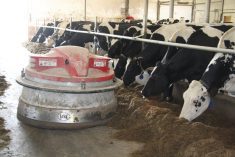The American Meat Institute has filed a lawsuit in U.S. District Court saying there is no legal or scientific justification for a continued ban on the import of Canadian cattle older than 30 months.
“We welcomed (the Dec. 29) announcement from the USDA about the final rule that restores beef trade with Canada regardless of age. But it is our view those rules do not go far enough,” said Mark Dopp, the institute’s senior vice-president for regulatory affairs and general counsel.
The AMI represents meat packers and processors and it wants unrestricted cattle trade between the two countries.
Read Also

Manitoba extends Crown land rent freeze
Manitoba government links the continued rental rate freeze on grazing and forage leases to economic and environmental challenges facing the industry
“The U.S. and Canada both have implemented state-of-the-art meat inspection and animal disease prevention systems. As we look across the borders, we see near mirror images of one another,” Dopp told reporters Dec. 30.
The lawsuit was filed a day after the U.S. Department of Agriculture posted a new rule effectively lifting the ban on Canadian cattle and beef since May 2003 when BSE was diagnosed in an Alberta cow.
The institute said it is not challenging the rule, but is seeking an injunction against enforcement of the original May 2003 ban.
The rule that appeared in the U.S. Federal Register Jan. 4 establishes a classification for countries at minimal risk for BSE. Right now, it only applies to Canada.
American meat packers who are members of the institute and the National Meat Association argue the border closing encouraged Canada to expand its slaughtering capacity by building new plants and adding shifts to existing plants. Meanwhile, U.S. packers were hit hard by short cattle supplies and high prices for lean beef and cows.
Association executive director Rosemary Mucklow said this inequity could leave American processors at a disadvantage because they may not be able to get enough older cows even though they have to compete with a glut of Canadian commercial beef imports.















